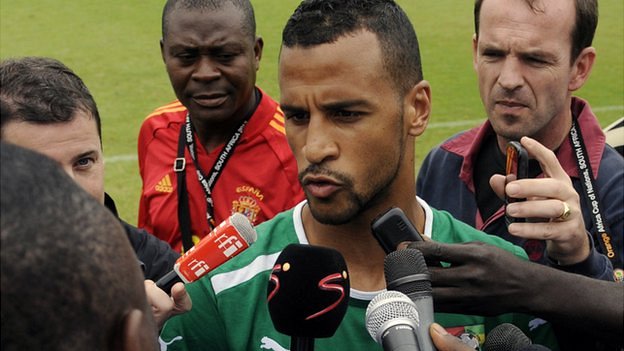By Mark Baber
June 12 – Despite FIFA’s decision to move Friday’s Libya-Togo World Cup qualifier from Benghazi to Tripoli, Togo’s captain Alaixys Romao (pictured) and Jonathan Ayite are refusing to take the trip on the grounds of personal security.
Some members of the squad, including Romao, were present on January 8, 2010, just prior to the African Nations Cup when two members of the Togolese delegation were killed and others seriously wounded as the national team bus was strafed by gunfire in an attack in Cabinda, Angola. Defender Djen Dakonam, speaking to the BBC said: “We are all appealing to FIFA to consider this and choose another venue outside Libya.”
The Togolese Football Federation (FTF) and the political authorities of Togo have also asked the Confederation of African Football (CAF) and FIFA to organise the tie outside Libya.
Romao explained his reasoning for not joining the trip on Twitter saying, “Human life is more important than football.” However, he added that he would be prepared to change his decision if those responsible for making the decision to hold the game in Tripoli would accompany the team.
Togo’s deputy coach Tchanile Bana said: “At our level, the only thing we can do is make another request for the match to be rescheduled somewhere else.
“But if it is not the case, we shall see how best we can handle the players who will accept to take the risk to go there.”
Last Friday 7 June, Libya was host to its first competitive international since the overthrow of Gaddhafi as Libya and Congo DR played out a 0-0 draw. Peterborough player Gaby Zakuani, who played in the fixture said “It was a really intimidating place from start to finish. You could hear gunshots going off during the two training sessions we had here. There were rocks being thrown on to the pitch and an army helicopter hovering above the stadium during the game. The manager has complained to FIFA about it.”
On Saturday, 31 people were killed and over 100 injured, including many seriously in clashes in Benghazi between a brigade of former rebels and protesters.
Following this incident FIFA issued a statement on Monday saying: “FIFA, in consultation with the Libyan Football Federation, confirmed the decision following the latest security incidents in Benghazi, where the match had originally been scheduled to take place at Benina Martyrs Stadium.”
This was followed on Tuesday by a bombing of an Italian embassy vehicle, which failed to cause any casualties due to the bomb being spotted by the driver. This latest incident underscores the dangerous security environment in the Libyan capital which recently saw a car bomb explode outside the French embassy on April 23 and a Boing 737 hit by gunfire coming in to Tripoli airport on April 17.
Security in Tripoli is handled by a variety of militia including the Supreme Security Committee (SSC), headed by Hashim al Bishr who has been described as a Salafi by the The German Institute for International and Security Affairs. Al Bishr described his organisation earlier this week to the Libya Herald saying: “Among them, there were drug dealers, smugglers, former prisoners released by Qaddafi during the revolution, and so forth. They joined the SSC to regain credibility. In many cases, it’s true that some people who perpetrate crimes are also members of SSC. You could consider the SSC as a mix of sheikhs, students and graduates from prison.”
However the authority of the SSC has been challenged by other groups, including Misrata and Tajura’s brigades who recently laid armed siege to the ministries in Tripoli.
Contact the writer of this story at moc.l1745657200labto1745657200ofdlr1745657200owedi1745657200sni@r1745657200ebab.1745657200kram1745657200
